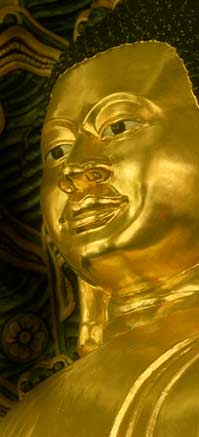| Forest Sangha Newsletter | October 1994 |
|
Sutta Class: Authority of a Teacher
'And how bhikkhus does the attainment of profound knowledge come by means of a gradual [graduated in steps] training...? As to this bhikkhus, one who has faith draws close; drawing close, he sits down nearby; sitting down nearby he lends ear; lending ear, he hears dhamma; having heard dhamma he remembers it; he tests the meaning of the things he has borne in mind; while testing the meaning, the things are approved of; there being approval of the things, chanda [interest, enthusiasm; c.f. tanha] is born; with desire born he makes an effort; having made the effort, he weighs it up; having weighed it up, he strives; being self-resolute, he realises with his person the highest truth itself and, penetrating it by means of wisdom, he sees. But, bhikkhus had there not been that faith, there would not have been that drawing near; there would not have been that sitting down...[and so on].
Bhikkhus you are on a wrong track, you are on a false track, bhikkhus. How very far, bhikkhus, have not these foolish persons strayed from this dhamma and discipline. |
|
The Buddha encourages the Kalamas not to believe on account of a teacher's reputation, nor scripture, nor tradition, but to test things out in the light of their own experience. |
|
At one time, the Buddha instructed the bhikkhus to refrain from eating after noon, saying that he felt healthy and quite at ease with this observance. Subsequently, Assaji and Punabbasuka, two of the leaders of the notoriously deviant "bhikkhus of the group of six" told the other bhikkhus that they also felt healthy and at ease eating whenever and as often as they liked. While staying at Kitagiri, the Buddha summoned these two bhikkhus and questioned them, asking whether they felt that he did not understand through his own experience that there are things which are pleasant and conducive to Dhamma, and things that are pleasant that are not conducive to Dhamma; similarly for unpleasant things. "Of course not, revered sir," they hastily replied. "Those who have freed themselves from the asava" [outflows - the firmly embedded attachments], continued the Buddha, "can feel that their practice needs no further effort; the rest need to develop the path."
Many people are familiar with the gist of the Kalama sutta, wherein the Kalamas, who have received a number of contradictory teachings from various sources, ask the Buddha which teaching they should follow. In that sutta [Gradual Sayings: Threes, Great Chapter, 65] the Buddha encourages the Kalamas not to believe on account of a teacher's reputation, nor scripture, nor tradition, but to test things out in the light of their own experience. |
|
However, in reviewing the Kalama sutta, one should recall that the Kalamas were not disciples of the Buddha, they had not taken Refuge in him as the Teacher; furthermore, that there is a distinction between faith and belief that Western religious thought does not always make. Faith is the faculty that allows for the suspension of one's beliefs, customs and habits in order to listen to something openly. It allows one not to know, but to have the confidence to investigate. Belief deals with the unknown in a different way. One adopts a certainty about something one is uncertain of, and rejects investigation. Without faith one cannot proceed, but with belief, no furtherance seems necessary. Faith as the first of the five indriya (spiritual authorities) is the basis from which application to the Buddha's teachings becomes possible. Faith stimulates the right application of effort to support the practice with initiative, inquiry and personal realisation, against, rather than in accordance with, one's outflow-habits.
By engendering the supportive faculty of faith in this way, the Teacher does not crush a disciple's independence, but empowers it. As the sutta concludes: For a disciple who has faith in the teacher's instruction and lives in unison with it, bhikkhus, the Teacher's instruction is a furthering in growth, giving strength. For a Buddha to feel personally offended that his disciples had contradicted him would be petty and impossible: 'This kind of higgling and haggling does not apply - that [...his followers] will or will not do this or that according as they like it or not.' It's not a power struggle. The point that the Buddha makes is that the recalcitrant bhikkhus - bhikkhus who had not checked the outflows of their habits and feelings - were attacking the foundation of their practice-path. The faculty of faith, of willingness to put into effect a simple instruction of the Teacher, was not active. Instead, they were believing in their own habits and feelings and going against the spirit of inquiry. |
 |
| So, now that the Buddha has passed away, what guidance is there for learners in following a lesser contemporary teacher? Teachers may make mistakes. In leaving the Dhamma-Vinaya as our guide, the Buddha has laid down the standards for authoritative teaching. To paraphrase his instruction to Mahapajapati Gotami [Culavagga X], his teaching leads to dispassion, to the absence of bondage, to non-accumulation, to wanting little, to contentment, to solitude, to arousing energy, to ease in supporting oneself. And one can check out the teacher's advice according to the following from the Mahaparinibbana sutta [Dialogues of the Buddha, 122] 'now the words of that bhikkhu are neither to be welcomed nor scorned...but if, when laid down beside sutta and compared with Vinaya, they lie along with sutta and agree with Vinaya, to this conclusion you must come: surely this is the word of that Exalted One...it was rightly taken.' |